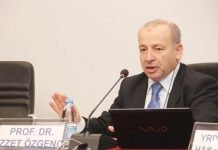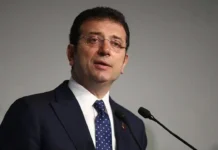The director of rights organization Amnesty International Moldova (AIM), Cristina Pereteatcu, has told the Balkan Investigative Reporting Network (BIRN) that they believe 48 Turkish residents in Moldova are under surveillance by Moldovan authorities and could share the same fate as seven Turkish teachers recently expelled from the country.
“Another 48 Turkish nationals could be expelled from Moldova. These would be people on a blacklist that are not only from the Horizont high school chain but who carry out other activities in Moldova, such as businessmen,” Pereteatcu told BIRN.
Asked about the fate of the seven Turkish teachers who are already back in the custody of Turkish authorities, Pereteatcu said they risked being sentenced to life in prison.
“We know that three of them are in a cell altogether, and the other four are in cells in different places of detention. They have access to a lawyer,” she added.
Pereteatcu said that AIM and other rights organizations in Moldova are preparing several reactions to Turkish President Recep Tayyip Erdoğan’s announced visit to the country on October 17-18.
Erdoğan is expected to attend the opening ceremony of the presidential palace of President Igor Dodon, which is being repaired by Turkish companies under a 10-million-euro contract paid for by TİKA, the Turkish Cooperation and Coordination Agency.
The director of AIM accused Moldovan authorities of committing forgery with official documents in order to try to show that they acted legally with the expulsions of the Turkish nationals.
Amnesty sent an urgent request to the Moldovan parliament on Sept. 6, asking it to explain why the hearings in parliament about the deported Turks were kept behind closed doors, saying the public was eager to know more about this case.
The authorities responded by saying that the motives for expelling the seven Turks remained a “state secret” and cannot be revealed to the public.
They said parliament’s commission on national security, defense, and public protection had organized a large hearing on the activity of the Intelligence and Security Service (SIS).
Within this, members of different parliamentary groups had conducted hearings with the competent authorities on the expelled Turkish citizens.
“The [hearing] session was a closed procedure and all the information was classified as a state secret,” the parliamentary commission told Amnesty International Moldova.
However, it said Amnesty’s request would be forwarded to the General Prosecutor’s Office.
After receiving this answer, Amnesty stated that was still “confused by the secrecy of the hearings of representatives of the authorities responsible for the kidnapping of a group of Turkish citizens.
“We consider this a matter of public interest and we reiterate that it is necessary to explain publicly the reasons for and the procedure for declaring these people undesirable,” it stressed.
Pereteatcu told BIRN that the main concern also is that Moldovans themselves could be targeted in such a manner in future. (turkishminute.com)















